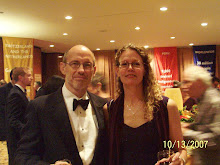At what price war?
Dear Editor,
Thomas Crawford (At What price peace? Letters 1-31-08) makes ghastly errors in responding to Deborah Metke (“Creating a war free world”). First, we aren’t ‘giving up our ability to protect ourselves’. That ideal vanished with the invention of the atomic bomb. At best, we managed to avoid mutual destruction, but in today’s world any undergrad biologist, agricultural chemist, wanna-be pilot or cyber punk -- with a mean streak or a real or perceived grudge -- can wield unimaginable damage to our nation.
We can’t stop the postal delivery of anthrax or rental truck’s filled with fuel oil and fertilizer, not to mention radical religious extremists with engineering degrees. For these feats we will need a world of people who don’t hate us and global institutions willing to help us find such killers before they strike. But, most importantly, we need a world of fair and enforceable laws that will assist in creating a world where the desire to mass murder is rare. Waging more wars won’t create that kind of world.
George Washington was correct. “Government is …force”. That’s why he and his wisest followers chose to build a government with effective checks and balances -- including an invaluable second amendment as the ultimate check against tyrannical government. With today’s growing array of increasingly lethal, affordable and ubiquitous ‘technologies’ and their undetectable/uncontrollable nature (think IEDs)… there is no government or global institution (not even the US military) that is capable of forcing a population to capitulate against their will. The only lasting success we will have in Iraq or Afghanistan is in winning hearts and minds -- not bombing them into submission.
Crawford really needn’t fear any strong UN military force. He should however, fear any place in the world where lawlessness exists. Today, the greatest lawlessness in the world exists in impoverished communities within nations and the artificial lines between them. A stronger UN could help elevate the lawlessness in both these arenas.
Crawford expossed a blissful ignorance of history however by stating “nationhood is a good thing” because “ it places a curb on the ambitions of would-be dictators.” Hitler, Stalin, Pol Pot, Saddam and every other mass murdering dictator depended on the sovereign rights of “nationhood” to protect their homicidal ambitions and actions. An ICC with the force of law could rally a world of support to stop any future genocidal dictators.
Mr. Crawford may be correct that “only” the EUs “elitist leaders are happy with” that super union. But the same was true of most colonists when our founding fathers were attempting to convert our confederation of 13 independent states into one vast ‘united states’. People were against it …until they realized the freedom and security advantages of legal unification. That is our choice today. At what price war?
At what price peace? (Letter printed in Washington Times 1-31-08)
Deborah Metke ("Creating a war-free world," Letters, Sunday) advocates giving up our ability to protect ourselves to a strengthened United Nations, which supposedly would guarantee peace by outlawing war. Personally, I think she is advocating a recipe for disaster.
The expression "enforce the law" means just that: to use force to assure that the law is complied with. George Washington once said, "Government is not reason, it is not eloquence, it is force; like fire, it is a dangerous servant and a fearful master."
To enforce a global peace, an entity must be strong enough to force all nations to do as it says. If it is strong enough to force all nations to do as it says, it is strong enough to impose global tyranny.
In fact, human nature being what it is, isn't that precisely what we should expect?
Even if we refuse to attribute bad motives to those currently heading the United Nations or NATO, if such power is ever assembled, sooner or later, some individual or group will succeed in gaining control of it, for his/her/their own ends. The world will be far safer if such power is never assembled.
As for the International Criminal Court about which Miss Metke is enthused, President Clinton (an advocate of the ICC) admitted it will not be based on fixed legal principles. Miss Metke urges us to look at the European Union. We should, indeed.
Only its elitist leaders are happy with it. The vast majority of the people in it are angry and frustrated, as they see decisions they historically made at the local level being taken away from them and made by unaccountable bureaucrats in Brussels.
Peace is always desirable, but not at any price. After Germany conquered Austria, France and Poland at the beginning of World War II, it was technically "at peace" with those countries.
From the 1950s through the 1980s, the Soviet Union was "at peace" with the Eastern European nations it had forced into the Communist Bloc. One reason why nationhood is a good thing is that it places a curb on the ambitions of would-be dictators.
THOMAS M. CRAWFORD
Laurel


0 Comments:
Post a Comment
<< Home